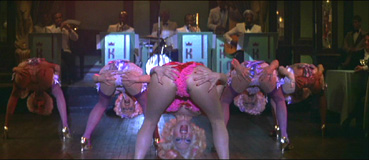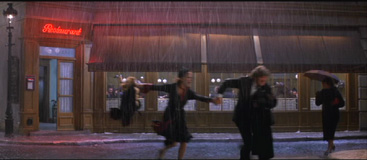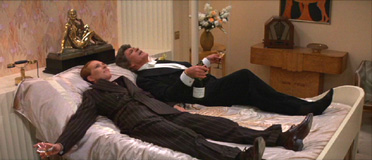Victor / Victoria (Blake Edwards) 1982
 Lesley Ann Warren gives the best performance in Blake
Edwards’ sexually adventurous musical comedy Victor / Victoria, and
it's while vamping
it up as an anachronistic, Marilyn Monroe-inspired gangster’s moll, brazenly
named Norma. That she doesn’t quite fit into the milieu of 1930’s Paris
nightlife scarcely matters here, since the tone and sensibilities are clearly
more influenced by the year the movie was produced than the one in which it is
set. Because Edwards’ high-class, rarefied, widescreen slapstick comedy
doesn’t for a moment pretend to contain any sort of resemblance to the real
world, it effortlessly introduces wildly realized creations like Norma, and even
when it begins espousing sentiments promoting the fluidity of gender, going much
farther than Billy Wilder’s Some Like it Hot (also set in the ‘30s)
could or seemed to care to, it barely breaks a sweat. Edwards’ vision is quite
sophisticated here, because he creates a world that can contain both the basest
sort of sight gag and the most sophisticated sort of grace. Every one of his
actors, including Edwards’ wife Julie Andrews (who plays the titular roles),
is willing to subject themselves to the occasional degradation that’s required
to put the audience’s guard down, but they do it without sacrificing their
appeal as movie stars. Since the director clearly takes pleasures in playing
with his actors in this way, and allows his audience to do the same, he shrewdly
sets a stage in which the sexual politics seem to come with the same deceptively
simplicity as the laughs.
Lesley Ann Warren gives the best performance in Blake
Edwards’ sexually adventurous musical comedy Victor / Victoria, and
it's while vamping
it up as an anachronistic, Marilyn Monroe-inspired gangster’s moll, brazenly
named Norma. That she doesn’t quite fit into the milieu of 1930’s Paris
nightlife scarcely matters here, since the tone and sensibilities are clearly
more influenced by the year the movie was produced than the one in which it is
set. Because Edwards’ high-class, rarefied, widescreen slapstick comedy
doesn’t for a moment pretend to contain any sort of resemblance to the real
world, it effortlessly introduces wildly realized creations like Norma, and even
when it begins espousing sentiments promoting the fluidity of gender, going much
farther than Billy Wilder’s Some Like it Hot (also set in the ‘30s)
could or seemed to care to, it barely breaks a sweat. Edwards’ vision is quite
sophisticated here, because he creates a world that can contain both the basest
sort of sight gag and the most sophisticated sort of grace. Every one of his
actors, including Edwards’ wife Julie Andrews (who plays the titular roles),
is willing to subject themselves to the occasional degradation that’s required
to put the audience’s guard down, but they do it without sacrificing their
appeal as movie stars. Since the director clearly takes pleasures in playing
with his actors in this way, and allows his audience to do the same, he shrewdly
sets a stage in which the sexual politics seem to come with the same deceptively
simplicity as the laughs.
 The prevailing mindset that suggests comedy is easier to
pull off than drama in cinema is probably what allows many of the best farces to
be so morally subversive. The lengths that Edwards goes to while setting up a
gag in Victor / Victoria really only become obvious in retrospect, and
that’s a big part of his outstanding ability as a filmmaker. The world of Victor
/ Victoria seems an utterly chaotic mix of styles, sexes, songs, and colors,
and it’s the jokes that finally place things into order. The audience
doesn’t keep their guard up in the same way while expecting humor as they do
while expecting pathos and because of that the deft comedy can slide in a
message every now and then without upsetting anyone. Since the silliness of the
gender confusion that propels most of the plot in this film is necessary to make
most of the jokes work, its presence feels like second nature by the end of the
movie. To accept much of the humor in the movie, it is almost necessary to agree
with the movie’s political theses.
The prevailing mindset that suggests comedy is easier to
pull off than drama in cinema is probably what allows many of the best farces to
be so morally subversive. The lengths that Edwards goes to while setting up a
gag in Victor / Victoria really only become obvious in retrospect, and
that’s a big part of his outstanding ability as a filmmaker. The world of Victor
/ Victoria seems an utterly chaotic mix of styles, sexes, songs, and colors,
and it’s the jokes that finally place things into order. The audience
doesn’t keep their guard up in the same way while expecting humor as they do
while expecting pathos and because of that the deft comedy can slide in a
message every now and then without upsetting anyone. Since the silliness of the
gender confusion that propels most of the plot in this film is necessary to make
most of the jokes work, its presence feels like second nature by the end of the
movie. To accept much of the humor in the movie, it is almost necessary to agree
with the movie’s political theses.
 Because Edwards’ cast so skillfully convinces us that his
tightly controlled environments are loosely thrown together, the energy level of
Victor / Victoria rarely flags. It somehow feels like a complete point of
view, since the director finds ways of easing the odd dissonance that arises
between the movie’s rebellious message and its strict technical formalism. The
pristine art direction reminds one of the theater that serves as the movie’s
backdrop, with its expressionistic use of bold colors, and sets that seem to
threaten to end just outside of the camera’s scope, but that only makes it
exciting whenever Edwards pans to the side and reveals that they don’t. The
focused attention that is given whenever one of the actors performs a musical
bit has a tendency to be interrupted by the background noise caused by a rude
patron. His tendency to play with his environments in this way makes the movie
feel more raucous than it might initially, and the treatment only adds to the
overall comic effect.
Because Edwards’ cast so skillfully convinces us that his
tightly controlled environments are loosely thrown together, the energy level of
Victor / Victoria rarely flags. It somehow feels like a complete point of
view, since the director finds ways of easing the odd dissonance that arises
between the movie’s rebellious message and its strict technical formalism. The
pristine art direction reminds one of the theater that serves as the movie’s
backdrop, with its expressionistic use of bold colors, and sets that seem to
threaten to end just outside of the camera’s scope, but that only makes it
exciting whenever Edwards pans to the side and reveals that they don’t. The
focused attention that is given whenever one of the actors performs a musical
bit has a tendency to be interrupted by the background noise caused by a rude
patron. His tendency to play with his environments in this way makes the movie
feel more raucous than it might initially, and the treatment only adds to the
overall comic effect.
* * * *
11-03-02
Jeremy Heilman